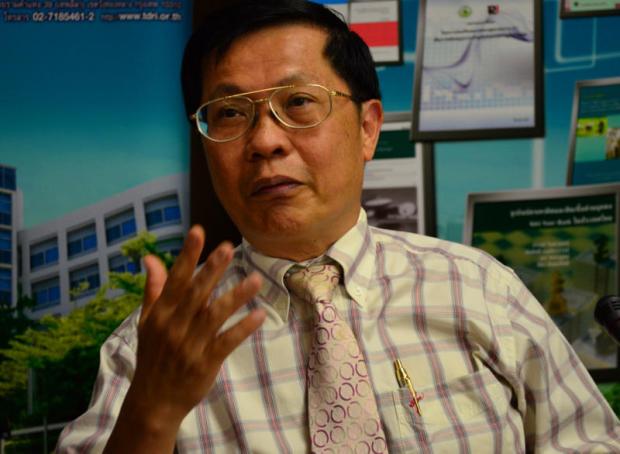
The government that will be elected this year is being urged to focus more on R&D and long-term solutions for rice management policy and steer clear from pledging or price guarantee schemes.
Nipon Poapongsakorn, a distinguished fellow at Thailand Development Research Institute, said the military-installed government's rice policy and management has continued to focus on short-term solutions during its four-year tenure.
"Although the government has come up with a comprehensive rice management policy that is considered a long-term solution, its methods to strike a balance between demand and supply and raise farmers' income are just short-term," said the outspoken academic. "It would be pretty hard for the government to raise the domestic rice price, as rice is an export product priced by the global market."
Mr Nipon said rice farmers are still beefing up production, notably in areas with adequate water supply, even as the government has initiated and promoted the megafarm scheme under which the government procures machinery and agricultural equipment for farmers who cut production costs and raise productivity.
"The megafarm scheme is just a grouping of rice farmers buying production factors at lower prices and securing loans at lower interest rates," he said. "It is not the grouping of rice farmland with soil improvements and water supply development that it should be."
Mr Nipon suggested that farmers themselves should be the persons making a voluntary decision on whether to grow alternative crops in lieu of rice, not the government or policymakers.
"The policymakers or the government's officials should function only as the facilitator to address farmers' limitations, such as farmland rental, as well as provide them know-how and technology," he said. "The farmers know their own production costs best, as well as their own growth capacities."
Mr Nipon said the right way to increase farm income is to support productivity enhancements. The government should also give special aid focus to rice farmers who grow rice in inappropriate areas and support them to work for the non-farm sector instead of growing alternative crops, he said.
"The country's agricultural restructuring efforts need more investment in R&D, but the government has spent less on rice R&D that helps strengthen the Thai agricultural sector in the long term," Mr Nipon said. "Thailand has ignored R&D investment for a long time, and Thai farmers have lacked knowledge and technology to increase their incomes."
The academic said the weak point of rice policy and management under this government is hefty spending on rice management in the short term.
"The current government spent up to 200 billion baht during 2014-18 for subsidy programmes and loan schemes for farmers who agreed to delay selling their stocks under the pledging programme," he said. "The budget for farmer assistance is bigger than the Agriculture and Cooperatives Ministry's fiscal budget and three times higher than the Royal Irrigation Department's budget."
Mr Nipon said such spending has not distorted the rice market but will weaken farmers' capability in the long run.
"The subsidy programmes will result in farmers staying complacent and unwilling to improve their productivity," he said.
Mr Nipon said Thai rice exports are also expected to see growing challenges from higher productivity and export capacity of competitors, low imports from rice-importing countries, technology disruption, climate change and declining rice consumption.
World rice prices are full of fluctuations because governments of many importing countries have extended their grip on the domestic rice market to protect and subsidise local produce. Importing countries will buy rice only when they face shortfalls, Mr Nipon said.
More importantly, the younger generation is not interested in agriculture, including rice farming, as it takes time and is hard work, he said.